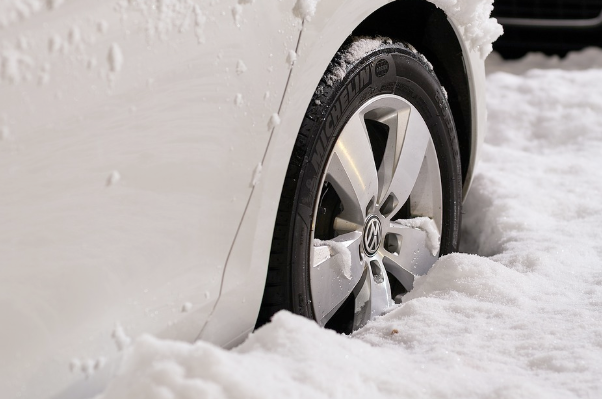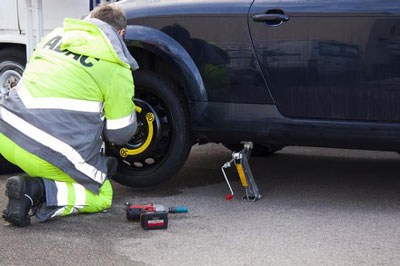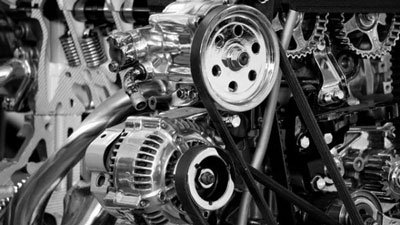Posted on 9/1/2018

As a general rule of thumb, if you reside in an area where temperatures go below 45 degrees Fahrenheit or 7 degrees Centigrade, you should seriously consider getting winter tires for your vehicle. The grip that your tires provide makes all the difference in keeping you safe, your passengers safe, and other drivers on the road safe. From braking to acceleration, the grip on your car is responsible for quite a lot when it comes to feeling secure in your automobile. The compound made to create winter tires are made with a different rubber that grips the road better in cold weather. It allows for extra grip which deters the car from slipping on icy and snowy roads. It's important to note that even vehicles that have four-wheel drive require winter tires if you reside in parts of the country that gets wintry mixes. Here are some things to keep in mind when you are driving on the roads this winter to avoid accidents in the ice and snow: Always drive with both hands on the whee ... read more
Posted on 8/1/2018
Doctor, Doctor, Gimme the News … History provides many insights. For instance, consider this prophetic quote from over 50 years ago: “In 1965 [more than 50 years ago], a car mechanic needed to understand 5,000 pages of service manuals to fix any automobile on the road. Today, with the advent of high-tech electronics, that same mechanic must be able to decipher 465,000 pages of technical text--the equivalent of 250 big-city phone books.” — Elizabeth Dole, U.S. Secretary of Labor, October 26, 1989 Finding State-of-the-Art Vehicle Care is a Challenge for Car Owners It’s now 2018, nearly thirty years later. Most of the automotive service and repair data that was once an old hard copy manual has been supplanted by bits and bytes and is now available electronically. But make no mistake: the volume of repair and service information that an auto mechanic needs to be able to access, navigate, understand, and apply today is astronomical. We call that Prog ... read more
Posted on 7/1/2018
We often take our vehicle’s air conditioning (henceforth, A/C) for granted — until it isn’t working properly or worse, isn’t working at all. Whether Downtown Denver, the greater City of Denver area, or outside the city on a road trip driving vacation — Sometimes that happens because we don’t practice good preventive maintenance or we create our own problems doing things ourselves. Modern vehicle A/C systems have changed, not only on Domestic and Asian brands, but especially the European vehicle brands we specialize in at Mancinelli’s Auto Repair Center. They’re much more complex, compact and precise in their specifications for type and amount of refrigerant, lubricating oil, and A/C system maintenance procedures. Moreover, if you own a hybrid vehicle, it’s even more complicated because they feature high-voltage electronics, alternating current electricity, and large liquid-cooled battery packs. Your vehicle’s A/C syst ... read more
Posted on 6/1/2018
When vehicles were more a collection of mechanical linkages back in the day, many automotive service and repair facilities used the phrase “good, better or best” with customers to describe an array of options to fix or service a car or truck. Depending on the vehicles usage and driver’s style, the adage provided consumers with a quality-durability-performance array to choose from. Like drum brakes, points and carburetors, that adage is well past its time. If you’ve moved on to drive more modern, software-defined vehicles — especially European makes and models or electrified automobiles — that have advanced technologies onboard, such as direct injection, electronic controls, high-pressure pumps or high voltage components, precision matters. Automobiles are now designed, engineered and built to far more stringent performance tolerances, and specifications are much more exacting. Good or better isn’t close enough for motorists who expect the imp ... read more
Posted on 4/1/2018
Let’s face it: All vehicles age, get tired and develop performance problems over time. This includes conventional gas-guzzlers and electric vehicles (EVs) —which include hybrid, plug-in and all-electric vehicles we see more and more of. Like traditional other vehicles, EV owners face four critical decisions: 1) Do I buy new or used? 2) When should I sell? 3) Is there a better way to know when? 4) Who should I trust to care for my EV and help me find those answers? EV Ownership Has Pros and Cons During the early years of EV ownership, regular routine maintenance costs are lower than fuel-powered vehicles. In addition, so are the operating costs. In fact, the more gas prices rise, the greater the savings EV owners realize. But all vehicles, even EVs, can get begin to show signs of wear and tear. When high voltage components in EVs begin to wear out, owners may soon face shocking replacement costs. An EV-savvy service and repair shop can make a huge diffe ... read more
Posted on 2/21/2018

As gas prices increase, drivers everywhere are looking for ways to save money in an effort to keep their fuel costs down. By not having to fill up at the pump regularly and extending the fuel economy of your automobile, this can be achieved easier than most think. While driving a more fuel efficient vehicle may be the biggest step in cutting fuel costs, most everyone is not going to give up their larger vehicles for a smart car any time soon. For this reason, other steps need to be taken helping save gas in the car or truck you already drive. By following these three simple steps, you can begin to increase your miles per gallon and eventually won’t be stopping for gas near as often. If you can save just one tank full in over a two month time span that’s roughly $20 per month saved with little to no effort and not having to trade in your current ride. As gas prices increase, drivers everywhere are lookin ... read more
Posted on 2/14/2018

When your car seems to be running well, it might be tempting to skip out on routine maintenance. After all, as the old adage goes: If it isn’t broke, don’t fix it. But when it comes to maintaining your vehicle, that is not the best advice. You need regular trips to your Denver auto repair shop to make sure your car stays running in tip-top shape and to protect it from bigger—and often more expensive—issues down the road. An oil change is one of those routine maintenance steps you need to take regularly. Oil Keeps Your Car’s Components Running Smoothly Getting rid of the old oil in your car and replacing it with new oil is important to do on a routine basis. There are many moving pieces in a car engine, and all of them need the lubrication of oil to keep them running smoothly. A marathon runner wouldn’t attempt ... read more
Posted on 2/7/2018

No one wants to think about themselves being stranded on the side of the road or the subject of any emergency, but proper preparation can make dealing with these instances bearable and could save your life. While many cars and trucks are now outfitted with standard roadside service kits, they may or may not be applicable to winter weather conditions which can change quickly and influence the needs for other items in the event of a vehicular emergency. Imagine driving down the road in the midst of a snowstorm trying to get home in order to be safely with your family. Instead, as you turn to continue on your way the car slides through the vacant intersection and off the road into the ditch. No one is around and you are stuck, without cell service and with the bad weather almost no one else on the road. Do you have essential items readily available in order to survive until ... read more
Posted on 1/31/2018

Today’s modern vehicles are basically computers, full of intricate moving parts that have been perfected over the decades. We rely on these wondrous machines in our everyday life, and while we appreciate their ability to get us comfortably from point A to point B, most of us have only a rudimentary knowledge of keeping them running. There are many myths about auto repair, but your Denver car repair experts at Mancinelli’s are here to debunk those misconceptions. Here are five of the most persistent myths about auto repair. Myth #1: Cars have become so sophisticated that regular maintenance is unnecessary. While it’s true cars have become much more sophisticated in recent years, things can still go wrong. Although minor items, such as a tire that has too little air or wheels that have been knocked slightly out of alignment, won’t impact your car’s performance too much, they can ... read more
Posted on 1/24/2018

Most motorists don’t consider how exactly their vehicle transitions power from the engine to the wheels moving the automobile. Instead, everyday drivers are more interested in the amenities and technology available inside the cabin and ensuring their car or truck starts when cranked. However, there are a variety of factors to consider when purchasing an automobile depending on an individual’s need, driving style, and conditions in which the vehicle will be driven regularly. Especially in terms of hazardous conditions, such as increased rainfall, snow driving, or gravel road use for a good portion of the vehicle’s life, then special consideration should be given to what drivetrain is needed. There are essentially four available systems that power the wheels of a vehicle to turn therefore moving the mode of transportation in question. These include front-wheel drive or rear-wheel dri ... read more